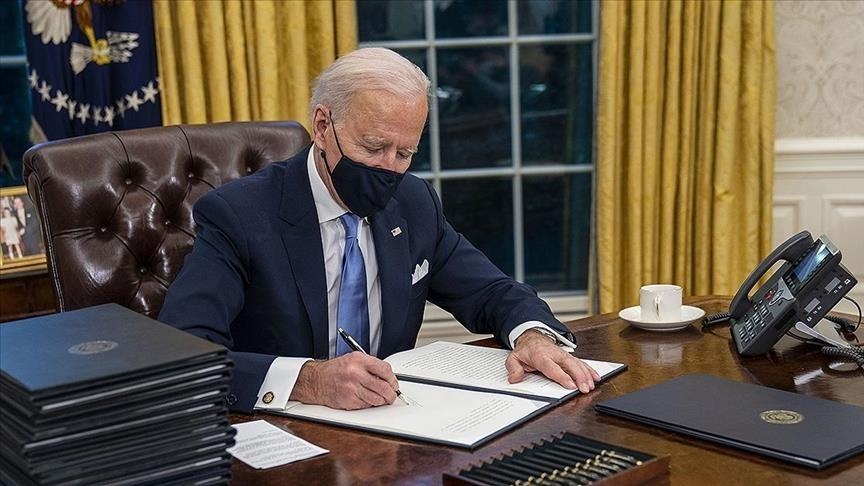Having referred to the decision of the U.S. President to allocate as much as $ 3.5 billion of frozen assets of Afghanistan in the U.S. to the families of the September 11, 2001 victims, Dr. Gholamreza Khaaji in an interview with the site of Strategic Council on Foreign Relations noted that:” unfortunately, we have witnessed time and again that the U.S. and the U.K. have not returned even the frozen assets that they have illegally blocked to the country of origin, and under different pretexts use both the interests of considerable amounts of deposits as well as claiming the principal money”.
Having stated that Biden’s decision has no reasonable link to September 11 and there was no Afghan national among hijackers, he added:” how can they substantiate that September 11 incident was engineered by states and or individuals!? No specific ruling and verdict has been issued by any court, even if a verdict is issued, the extraterritorial credibility of such a court is questionable and its legal effects should be studied. Now, the fact is that the U.S. has confiscated the assets of Afghanistan and it should return them”.
Receiving Compensation in an Illegal Way
Having elaborated some analyses through which it has been emphasized that September 11 incidents had already been coordinated with some of the American statesmen, the professor of international law raised the question that why the U.S. negotiated with Taliban if they were directly linked to the September 11 attacks? And returned them back to power? he said:” the individuals involved in the attacks were not linked to any government that can be subjected to a state’s chastisement. Considering all conditions, receiving compensation is an illegal act with no logical base matched with the decision”.
Having referred to the White House spokesman who had said the money can not be transferred as long as the court makes decision about deducting compensation from Afghanistan’s assets. He explained about the measures that should be taken for legal pursuit of the decision:” when a state commits such a breach of law, the doctrine of International Responsibility of States can be applied which provides a legal and ethical base for humanitarian intervention, which of course requires the cooperation of other states”.
While referring to the warnings issued by organizations active in humanitarian affairs and contributing countries to Afghanistan about the outbreak of an imminent humanitarian crisis in the country, he stated that more than a third of total 38 million population of Afghanistan is facing emergency level or unsecured food crisis. He added:” Afghanistan is now suffering from the consequences of 20-year long U.S. occupation and according to UNICEF, if urgent measure is not taken to solve the living problems of the people of the country, one million children will lose their lives due to severe malnutrition”.
U.S. Instrumental Use of Dollar
Having underscored the U.S. continued instrumental use of dollar, rising popular dissatisfaction to the procedure and its consequences, Khaaji added:” it seems that Taliban does not have the possibility to employ necessary mechanism to reciprocate and to retrieve the frozen assets. In such a situation, international law makes other countries to collectively deal with the wrongdoing country and through legal means make it to compensate its violation”.
The university professor pointed out to the silence of the Western countries versus the U.S. illegal decision. He said:” unfortunately, there are weaknesses in various fields of international law system and also concerning the execution guarantee. The issue applies to the legal mechanisms to confront confiscation of assets”.
Counterproductive Consequences of Biden’s Decision
Having emphasized that the measure taken by the U.S. has counterproductive consequences for international law and international relations, Khaaji explained:” We witness in legal international centers, even in Hague Tribunal where recently judged about Iran and the U.S. dispute, in the Human Rights Council and even among international judges, the U.S. is recognized as having a discredit and distrustful Administration. Any financial relations with the U.S. is always coupled with the risk of assets to be frozen and blocked under different pretexts”.
The analyst of international law referred to critiques of some countries concerning Biden’s decision, for example the remarks made by the Spokesman of China’s Ministry of Foreign Affairs who had said “the richest country of the world is plundering the poorest country” and added:” when a country freezes the assets of another country and intends to confiscate them, the other country is entitled to file a lawsuit for the confiscation”.
Khaaji stated that the frozen assets were among the foreign exchange reserves that used to back liabilities of national currency of Afghanistan. Concerning the economic consequences of its consumption, he reminded:” if the reserves are consumed, then the national currency of Afghanistan will be devalued, as we witnessed the further devaluation of the national currency during the past few days after Biden’s decision was announced. If the frozen assets are spent, we will witness the continuation of spiraling inflation rate and devaluation of the national currency of Afghanistan”.
He mentioned the U.S. rising discredit among the public opinion and other countries as one of the consequences of Biden’s decision to confiscate the assets of the people of Afghanistan and said:” New human right laws emphasize that in connection with economic issues, the world should further engage itself in economic relations to enable countries further act in the field of economic justices. Moreover, the Resolution of the United Nations General Assembly also makes countries to expand their economic relations and thus to boost international trust and international relations”.
Khaaji continued:” when a country freezes and blocks the assets of another country like thieves and blackmailers through its domestic rulings and national rules, it has acted against international custom and norms and has made hindered the boost of international relations”.










0 Comments